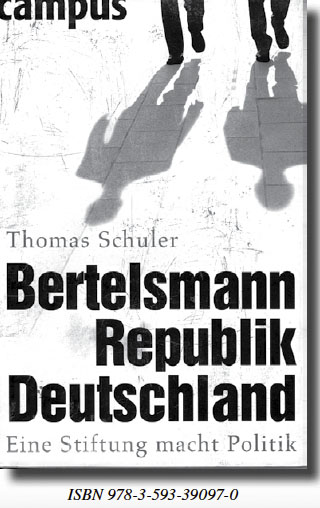Foundations increasingly set the tone in education policy
Foundations increasingly set the tone in education policy
by Wolfgang van Biezen
The “Curriculum 21” rejigs a grown and well-functioning educational system fundamentally. Moreover, the related inter-cantonal teaching materials at the same time further weaken the federal structure of the Swiss educational system. Finally, the product of a more than ten years, partly secret work, is presented to an eye rubbing public. All these occurrences raise some questions: Cui bono? Who benefits from it? Who are the initiators? Who profits, and who finances?
A not to be underestimated contribution makes the unobtrusively, but high efficient work of some foundations. Beyond parliamentary control and constraints and by means of money they enforce their vision of an economised, all over Europe controllable and conductible school.1
The Bertelsmann Foundation understands itself as the mother of strategic foundations. A “strategic foundation” undergoes a pan-European ranking in which Bertelsmann defines which foundation is a good one and which not. Bertelsmann subsequently shares the European foundation market with other strategic foundations both geographically and in terms of content respectively issues. Networking begins. This saves money and resources and allows a more targeted, by Bertelsmann controlled approach. In case Bertelsmann has begun to think about a project, they will launch start-up financing, which in the first place includes the relevant actors of the administration as well as their scientific support by universities and high schools. Moreover, Bertelsmann coaches high-level civil authorities.2
After OECD has expressed the wish for a standardized European educational system and the Bologna-reform at academic level has already taken a step in this direction, the European countries now move forward to adapt their elementary school system. In Switzerland already 2003 the Jacobs Foundation – which is a Bertelsmann partner foundation and responsible for the Swiss education system3 – implemented the Schulprojekt 21 (School Project 21), which mirrors the economic requirements of the OECD, and was formulated by Bertelsmann in Germany as the curriculum for the 21st century and now in the Curriculum 21.

In 2003, Ernst Buschor, an expert of the Swiss educational landscape, also became a member of the board of the Johann Jacobs Foundation, acting as door opener and having the School Project 21 by the Bertelsmann Foundation bringing with him all currently known implications as heterogeneity, differentiated and competence-based education, teacher as a coach, mixed age learning and so on. Ernst Buschor, well known as Director of Education of the canton of Zurich and as President of the Schweizerischen Hochschulplanungskommission (Swiss Academic-Education Planning Commission), and amongst others at the same time was member of the Bertelsmann Foundation Trustees and board member of the Jacobs Foundation. However, this seemed to bother nobody, although under his influence novelties like PPP (Public Private Partnership = privatisation of public facilities) and NPM (New Public Management = management of public authorities based on economic points of views) have found entrance into the education system of different cantons.
The research by Tonia Bieber, University of Bremen, threw light upon this process, by investigating the enforceability of political influence in Switzerland controlled from outside.4
The “strategic work of the foundations” in a first step secretly takes its course in the Swiss education landscape. The start-up funding of the Jacobs Foundation initially amounts to one million Swiss Francs.5 Associations like the national Swiss teacher association LCH, the cantonal teacher associations, and the universities are invited to participate. The top leaders are trained amongst other places at the foundations’ own seminar-hotel Schloss Marbach at Lake Constance. Adaptation strategies for the implementation to the respective cantonal rules are developed.6
A member of the Jacobs Foundation Board of Trustees is Prof Dr Jürgen Baumert, who as the director of the Max Planck Institute for Human Development is in charge of the PISA studies. He embodies a direct line from the Jacobs Foundation to the OECD.
Based on a many years’ (secret) preparation before its implementation, the previous costs of Curriculum 21 can be seen as significant for the public sector and thus for the taxpayer. Therefore it is high time that the citizens of this country take care of the serious consequences of this constructivist curriculum for pupils, teachers and parents. It is high time that they inform themselves, have their say, and participate.
1 “The Jacobs Foundation has two emphases: research and local projects. Research activities focus on this field, whereby its impact increases and it strengthens its positive effects on social processes. As a private organisation, the foundation has a great freedom of action. However, it does not replace the government, but it is able to take more risks that are excessive and advance more rapidly than the government. This is important to cause social changes and to be some kind of social pioneer. I think that the Jacobs Foundation succeeds quite well.” (Address by Pascal Couchpin during his formal reception as a member of the Jacobs Foundation Board of Trustees)
2 Thomas Schuler. Bertelsmann Republik Deutschland. Eine Stiftung macht Politik. Campus Verlag GmbH, Frankfurt a. M. 2010
3 Klaus J. Jacobs, President of the Jacobs Foundation, “Jacobs Center for Productive Youth Development”, opening ceremony, 2 April 2003
4 Sonderforschungsbericht 597 by Tonia Bieber, Bremen: Soft Governance in Education. The Pisa Study and the Bologna Process in Switzerland
5 Johann Jacobs Foundation, annual report 1998, p. 20
6 Johann Jacobs Foundation, annual report 1996, p. 7f